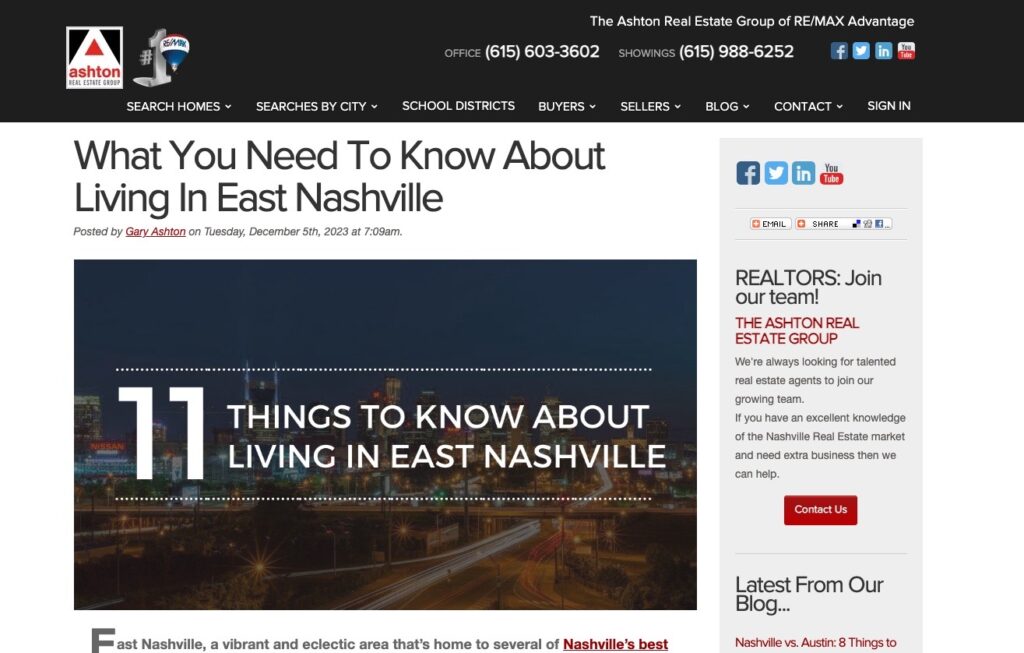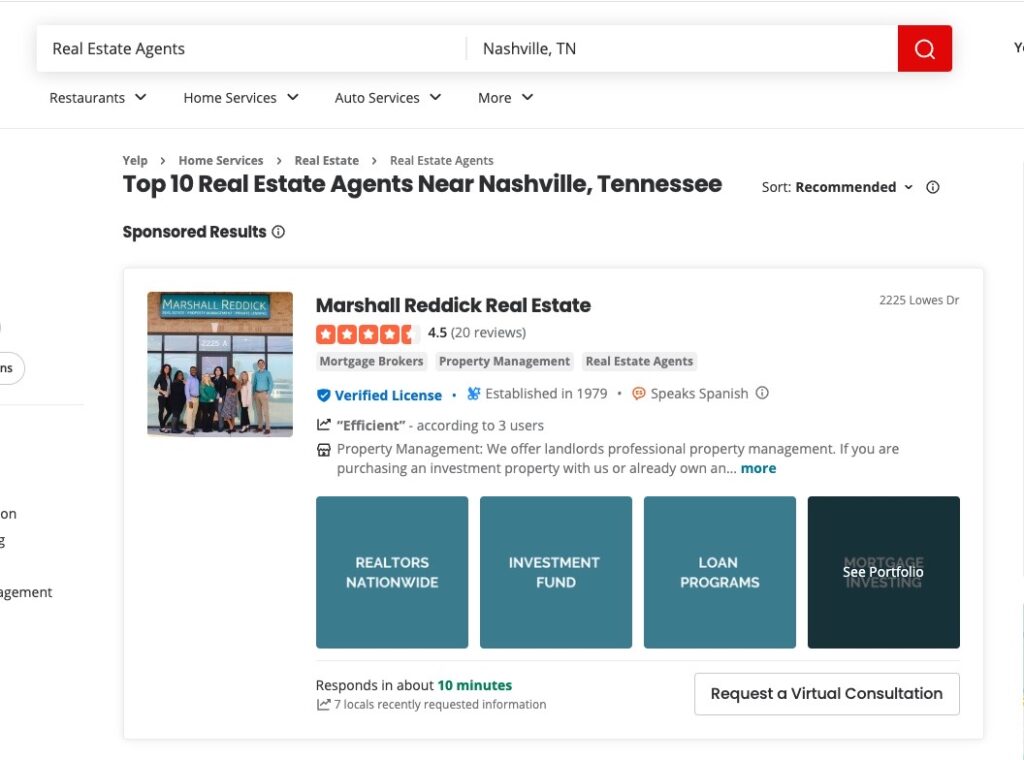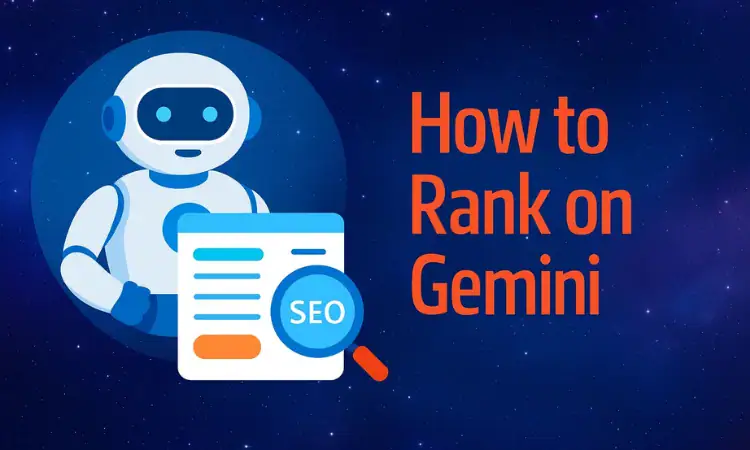Are you a realtor struggling to rank in local search results? Hyperlocal SEO is your solution for standing out in a congested market and connecting directly with buyers and sellers in your target neighborhoods.
In this article, we explain concrete strategies essential to successful hyper-local SEO for realtors. We will show you how to optimize Google Business Profiles, create neighborhood-specific content, leverage social media, build local links, and more.
Looking for help? Check out our Real Estate SEO Services or Get In Touch Today.
What You’ll Learn
- Hyperlocal SEO enables realtors to target specific local markets for better visibility and lead generation.
- Create and maintain an optimized Google Business Profile, generate positive reviews, and regularly update your business information.
- Create geographically optimized, localized content that provides value to the readers.
- Produce community-engaging content, partner with local businesses, and ensure a seamless mobile user experience.
Building a Strong Google Business Profile
Your Google Business Profile is like your digital storefront, and in the real estate industry, curb appeal matters. Crafting a powerful profile that pops up in local searches and the coveted ‘map pack’ can make a world of difference. It also makes you visible on Google Maps, which is a non-negotiable in contemporary real estate marketing.
Optimizing your profile with precise categories (for example, commercial real estate), business information, and superior visuals creates an inviting digital entryway for local searchers. Well-optimized Google Business Profiles can also contain links to social media accounts, posts, FAQs, and photos of listings or projects you worked on.
Finally, you will need to track your profile’s performance through Google Business Profile Insights and measure clicks, calls, keyword searches, and direction requests. This will allow you to create a data-focused real estate marketing strategy.
NAP+W
NAP+W stands for business name, address, phone, and website. This business information needs to be up-to-date in every business listing you create. If you change any of these, make sure to change them across all business directories, whether it’s real estate agent directories, Yellow Pages, Yelp, or Better Business Bureau.
Encouraging Reviews and Engagement
Positive reviews are the digital equivalent of word-of-mouth recommendations. They signal to search engines that your business is a trusted entity, further boosting your rankings and online visibility. Here are some strategies to encourage and engage with reviews:
- Encourage your satisfied clients to share their experiences online.
- Make it a habit to engage with their feedback and respond to negative reviews, too.
- Amplify your credibility by responding to reviews and thanking customers for their feedback.
Hyper Local SEO for Realtors: Localized Content
To appear in relevant search engine results pages (SERPs), it is not enough just to have a sleek real estate site. You will also need to create a Google Business Profile to appear in Google Maps, appear in local directories, and connect to other businesses through local community events.
Hyperlocal SEO is your golden ticket, allowing you to laser-target your real estate marketing efforts to the community you serve. Finally, real estate websites must be optimized for mobile devices, supported by local links, and filled with helpful neighborhood pages.
Crafting Neighborhood-Specific Pages
Imagine a prospective buyer or seller landing on your site and finding a treasure trove of information tailored to their specific neighborhood. This is the art of creating neighborhood-specific pages, rich in local history and property insights that establish your expertise and boost your visibility in local search results.
When you develop useful neighborhood pages, you not only become an authoritative local source but also start attracting clients with an interest in the area.
Leveraging Local Keywords for Maximum Impact
The magic of local SEO lies in the power of local keywords. Imagine the advantage of appearing at the top of search results when someone types in “Victorian homes in [Your Neighborhood].”
Utilizing tools such as Google Keyword Planner allows you to uncover long-tail keywords that users are actively searching for. Incorporating these into your content helps create a direct connection with users seeking specific, location-based answers.

Some examples of area-specific keywords you can use to create content are:
- Victorian homes in [Neighborhood]
- Best restaurants in [City]
- Things to do in [City]
- [City] attractions
- [City] events
- Housing market trends in [Neighborhood]
By using relevant keywords in your content, you can improve your visibility in local organic search results and attract targeted organic traffic to your website. To further enhance your online presence, consider a free local SEO consultation.
Connecting With the Community Through Content
In real estate, forging a personal connection with your community can set you apart. By sharing content that resonates with locals, such as client success stories, neighborhood spotlights, and local market insights, you establish yourself as more than just a realtor — you become a trusted ally and resource.
This connection not only enriches your brand’s story but also strengthens your SEO as you become synonymous with local real estate expertise.
Blogging About Local Events and Market Trends
Capture the pulse of your community by blogging about neighborhood events, market trends, and developments in the area. This positions you as an expert and provides tremendous value to your audience.
Lists of top properties, insights into up-and-coming areas, and coverage of community happenings all contribute to a larger narrative that you’re the go-to source for all things real estate in your area, enhancing your local SEO and establishing your website as a hub of valuable information.
Collaborating with Local Publications
Collaborating with a local paper or blog can widen your reach and bring in a wealth of backlinks, which are like votes of confidence in the eyes of search engines. By contributing your expertise, you gain exposure and build a web of connections that solidify your status as a local real estate authority.
This collaborative strategy intertwines your brand with the fabric of the community, enhancing your hyperlocal SEO and driving more traffic to your site.
Optimizing On-Page Elements for Local SEO
A well-optimized real estate website doesn’t just happen — it’s meticulously crafted with on-page SEO elements that search engines love. From compelling content that’s a joy to read to internal links that guide visitors through your site, every element plays a role in boosting your search engine ranking.
And with Google’s mobile-first indexing approach, ensuring your site is responsive and mobile-friendly is a prerequisite for search engine optimization success.
Meta Descriptions and Title Tags That Convert
The real estate market is crowded, but with title tags and meta descriptions that grab attention, you can stand out. A title tag is the title of a page that you can see in the SERPs, while a meta description is the text shown under it, summarizing and introducing the page’s content.
Although they are both quite short, they’re essential as potential readers read them and judge whether or not to click on your page. Here are some tips to help you craft effective title tags and meta descriptions:
- Use targeted keywords in your title tags to improve your search engine rankings. Make them location-specific.
- Write meta descriptions that speak directly to your audience’s needs and highlight the benefits of your services.
- Keep your meta tags brief but informative. For title tags, aim for under 575 pixels or about 60 characters maximum.
- The optimal size for meta descriptions is 680 pixels (around 120 characters) on mobile devices. Use a meta tag SEO tool to check what the final result will look like.
- Use compelling language to encourage click-throughs. Use power words or calls to action.
Geo-Tagging Images
If you want your website’s listing photos to appear in geographically relevant Google searches, you can make sure they are geo-tagged. Geo-tagged photos have information about their location embedded in their metadata.
As a realtor, there are two ways to geo-tag photos. One is to use a GPS-enabled camera when photographing your listings, and the other is to use an online tool to include the information later.
Image Optimization
When creating a neighborhood-specific blog post, you will want to add images with descriptive alt text that includes the location. Also, make sure to reduce the image file size to make it easier to load on all devices.
Engage and Network on Social Media
Social media isn’t just for sharing listings. It’s a powerful tool for local networking, engagement, and generating leads. Active participation in local groups and sharing content that resonates with your community helps forge stronger local connections and amplifies your brand’s voice.
A strong social media presence can indirectly boost your SEO, as increased engagement and links from these platforms increase your traffic and boost your overall rankings.
Active Participation in Local Groups
Diving into local Facebook groups and online forums can be a game-changer for local real estate agents. These platforms offer a direct line to your community, allowing you to share insights, answer questions, and showcase your knowledge of the local market as a real estate agent.
By being a helpful and active participant, you not only build trust with locals but also reinforce your online presence.
Sharing Geo-Targeted Content
Localized content is your secret weapon on platforms like Google Business Profile, Facebook, and Instagram. Updates that highlight the local area allow for more meaningful engagement with potential clients.
Geo-targeted content, whether it’s about market trends or events in your area, helps you connect with the community, boosting engagement and enhancing your local SEO footprint.
Local Link-Building Strategies for Real Estate Agents
Link-building is a cornerstone of SEO, with local backlinks serving as a testament to your relevance and authority in the real estate sector. Forming strategic partnerships and involving yourself in community activities can create a network of relevant links that can boost your website’s search engine rankings.
This enhances your visibility and showcases your commitment to the community, a vital aspect of building a successful real estate brand.
Partnering With Other Local Businesses
Collaborating with local businesses opens doors to new backlink opportunities while significantly boosting your website’s SEO. Here are some ways to collaborate:
- Cross-promotional events
- Guest blogging
- Joint social media campaigns
- Co-hosting workshops or webinars
- Sponsorship opportunities
By partnering with businesses such as contractors, moving companies, interior designers, and home improvement stores, you reinforce your presence as a local business and establish a robust online network that benefits all involved.
These partnerships offer a win-win scenario, fostering community spirit and enhancing your digital footprint.
Sponsorships and Local Event Participation
Getting your name out there can sometimes mean stepping away from the digital world and into the heart of the community. Sponsoring local events and taking part in community activities results in valuable backlinks and improved local optimization.
These sponsorships not only reflect your investment in the community but also drive traffic to your site, increasing your online authority and visibility.

Navigating Local Listings and Directories
Local listings and directories are the crossroads where many property searches begin. Ensuring consistency in your business information across these platforms is crucial for maintaining a clear and authoritative online presence.
By accurately managing your listings, you increase your chances of being found by local searchers, strengthening your SEO and driving more traffic to your real estate website.
Claiming and Verifying Listings
All strong local SEO strategies involve:
- Claiming and verifying your real estate listings across various directories
- Authenticating your business
- Ensuring that your contact information is consistent and accurate
By taking control of your listings, you improve your visibility in the SERPs and instill confidence in potential clients during their real estate search or home selling process.
Managing Information Across Platforms
With so many local directories to consider, managing your business information can be daunting. However, using centralized tools like Bright Local can streamline the process and ensure that your listings remain accurate and up-to-date.
Consistent information across platforms is key to solidifying your online reputation and making sure that potential clients have the correct details to reach out to your real estate agency.
Streamlining Mobile Search Experience
The mobile search experience is often the first touchpoint for potential real estate clients. A website that loads quickly and offers seamless navigation on mobile devices is paramount for keeping users engaged and converting them into leads.
Optimizing for mobile caters to the increasing number of users who prefer property searches on the move, keeping your real estate website within easy reach at all times.
Responsive Design and Speed Optimization
Responsive design is not just about aesthetics — it’s about functionality and user experience. A real estate website that performs flawlessly across all mobile devices captures more leads and retains user interest. Focusing on speed optimization techniques, like image compression, significantly reduces load times, improving search engine rankings.
Localized Mobile Content Strategies
Creating content optimized for mobile users means understanding their needs for quick, accessible information. Real estate agents can use strategies like embedding responsive widgets, ensuring content is easily digestible with bullet points, and using engaging headlines to keep mobile users interested.
These efforts in crafting mobile-friendly content not only improve the user experience but also enhance your site’s local search rankings, making your real estate offerings the first choice for on-the-go searchers.
Harnessing Advanced SEO Tools
In the quest to top local SERPs, real estate agents can gain an edge by utilizing advanced SEO tools and focusing on their real estate SEO efforts. These tools offer invaluable assistance in keyword research, on-page optimization, and building a robust strategy that aligns with current trends and algorithms.
Embracing these resources will not only streamline your SEO efforts but also provide insights that can direct your marketing initiatives for greater impact and reach in the local real estate market.
Utilizing SEO Plugins and Integrations
SEO plugins and integrations are the trusty sidekicks in your SEO journey, offering guidance and automation that can enhance your website’s performance. With tools like Yoast SEO, real estate agents can easily optimize content and tackle technical SEO tasks with confidence.
These plugins not only simplify the optimization process but also equip your website with the necessary features to meet search engine expectations, boosting your online presence and driving more traffic to your listings.
Deploying SEO Analytics for Insightful Data
Data is the compass that guides your SEO strategy, and analytics tools like Google Analytics and Google Search Console are indispensable in navigating the vast seas of digital marketing. Tracking performance and understanding audience behavior enables real estate agents to make data-driven decisions.
Utilizing these tools to monitor keyword rankings and search engine visibility informs your approach, ensuring that your efforts yield the best possible results in the competitive real estate landscape.
Summary
Embarking on the hyperlocal SEO journey equips you, the savvy realtor, with the tools and strategies to command the local real estate market. From crafting neighborhood-specific pages to engaging with the community and deploying powerful SEO tools, each step taken is a stride toward establishing your online authority.
The digital realm is your stage, and with hyperlocal SEO, you can ensure that you’re not just a player but the star of the show, captivating your local audience and turning searches into successful sales.
Frequently Asked Questions
How does hyperlocal SEO differ from general SEO for real estate?
Hyperlocal SEO for real estate emphasizes targeting specific neighborhoods and using localized keywords to connect with searchers in a particular area, while general SEO focuses on broader search terms that may not effectively reach a localized audience. It’s important to tailor your SEO strategy to the specific needs of your real estate audience.
Can I optimize my Google Business Profile for hyperlocal SEO?
Yes, you can optimize your Google Business Profile for hyperlocal SEO by selecting accurate categories, filling out business information with area-specific keywords, and regularly posting community-focused content. It’s a great way to boost your local visibility and attract more customers.
What are long-tail keywords, and why are they important for real estate SEO?
Long-tail keywords are crucial for real estate SEO because they cater to more targeted search queries, leading to higher conversion rates for your business. Using longer and more specific keyword phrases can help capture potential clients who are closer to making a purchase or using voice search.
How can I encourage my clients to leave reviews that help my SEO?
Encourage clients to leave reviews by sending follow-up emails after a successful transaction. Provide easy-to-follow links to your review platforms, and gently remind them of the difference their feedback can make. Always respond to reviews, as this engagement can also boost your SEO.
Are backlinks really that important for SEO, and how can I get them?
Yes, backlinks are essential for SEO as they show search engines that other websites find your content valuable. You can obtain them by partnering with local businesses, sponsoring events, writing guest blog posts, and collaborating with local blogs.
















